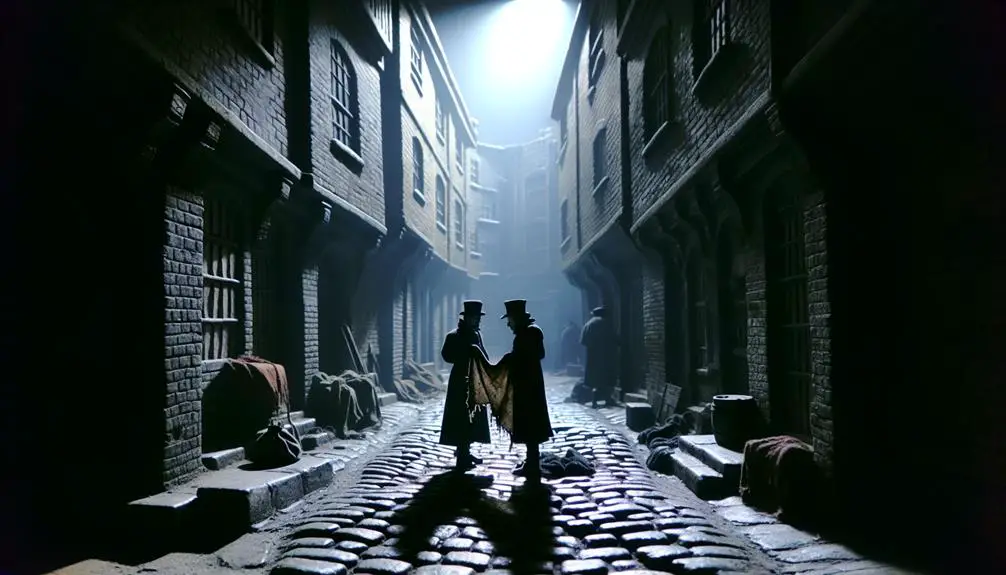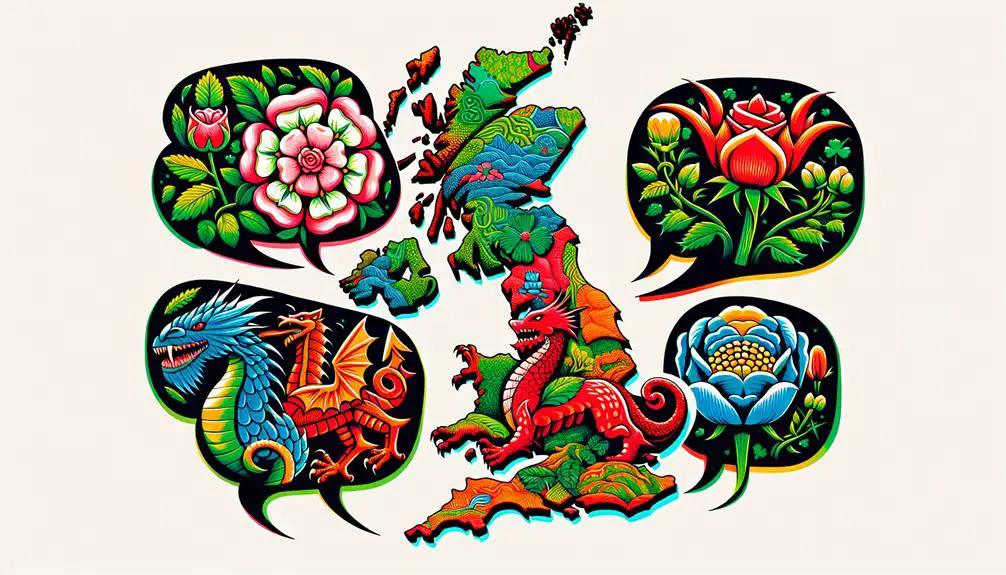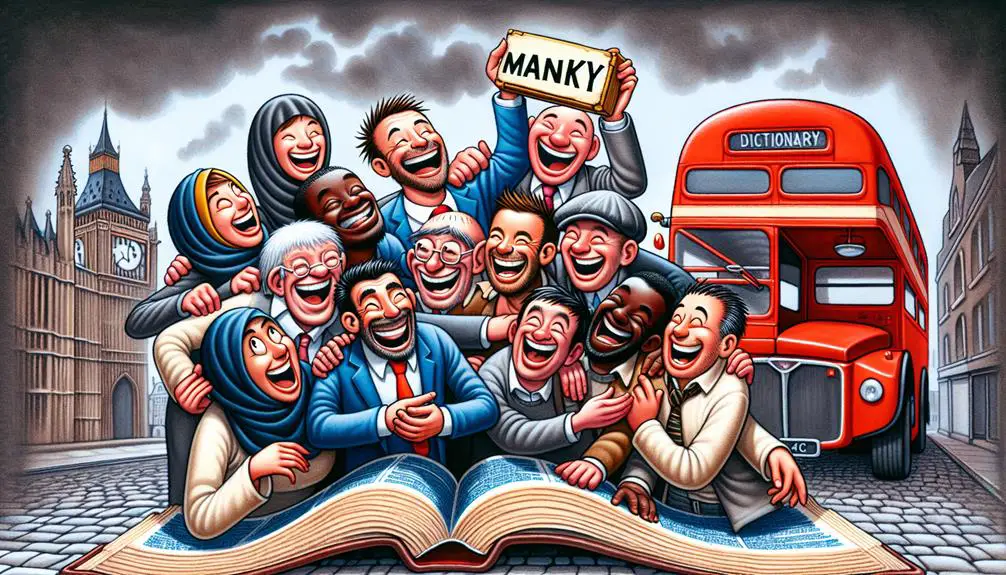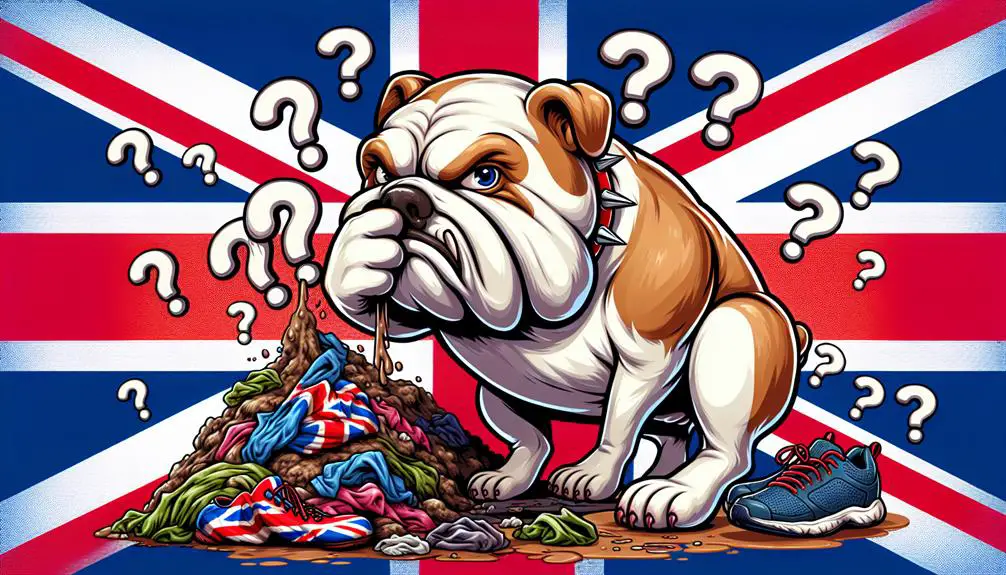Imagine you're walking through the bustling streets of London and overhear someone exclaim, 'That's absolutely manky!' You might wonder what they're on about.
This piece of British slang, which can mean something is dirty, unpleasant, or of poor quality, is rich in history and nuance. As we explore the origins of 'manky,' how it's used in modern contexts, and its regional variations, you'll uncover a fascinating layer of British culture.
But why has 'manky' endured in the lexicon, and how does it compare to similar slang globally? Stick around, and you'll find the cultural impact of this seemingly simple word is anything but.
Origins of 'Manky

Delving into the origins of 'manky', it's essential to note that this term, indicative of something being dirty, worn out, or unpleasant, emerged from the dialects of Northern England. Its roots can be traced back to the early 20th century, where it encapsulated the essence of dissatisfaction with the state of an object or situation. The etymological pathway of 'manky' reveals a fascinating journey from regional vernacular to widespread usage, shedding light on the socio-linguistic dynamics of the time.
The term 'manky' likely evolved from the French word 'manqué', which translates to 'failed' or 'defective'. This origin suggests a transition from describing a lack of success or deficiency in quality to denoting physical dirtiness and wear. It's a testament to the fluid nature of language, where words adapt and morph in meaning as they migrate across cultural and linguistic boundaries.
Moreover, 'manky' reflects the socio-economic conditions of Northern England during its period of emergence. It was a time characterized by industrialization, urbanization, and the consequent deterioration of living conditions for the working class. The word became a concise way to articulate the grim reality of their environment and possessions, which were often 'manky' due to economic hardship.
In academic circles, the study of 'manky' offers insight into the adaptive mechanisms of language in response to societal changes. It exemplifies how regional dialects contribute to the richness of a language, providing nuanced ways to describe the human condition. Thus, understanding 'manky's origins not only enriches one's vocabulary but also offers a window into the historical and social contexts that shape linguistic evolution.
Manky' in Modern Use
In contemporary usage, 'manky' has transcended its regional origins to become a widely recognized term within British slang, denoting objects or conditions of dirtiness and disrepair with nuanced implications. Its application stretches beyond mere physical uncleanliness to embody a broader spectrum of negative connotations, often reflecting a sense of moral or aesthetic degradation. This linguistic evolution underscores the adaptive nature of slang within the dynamism of cultural discourse, highlighting how colloquial terms acquire layered meanings over time.
To grasp the breadth of 'manky's' modern application, consider its usage in various contexts:
| Context | Implication |
|---|---|
| Personal Hygiene | Conveys a strong disapproval of one's cleanliness, often implying neglect or poor grooming habits. |
| Living Spaces | Describes environments that are not only physically unclean but also suggest neglect or a lack of care, potentially reflecting on the inhabitants' lifestyle or values. |
| Food and Consumables | Indicates spoilage or unfitness for consumption, often evoking a visceral reaction to the idea of ingestion. |
This table showcases the term's versatility and its ability to convey complex judgments about hygiene, care, and suitability. The term's adaptability to different contexts without losing its core meaning of uncleanliness or neglect speaks to its robustness in the lexicon of British slang. Analyzing 'manky' in modern use reveals not only its role as a descriptor of physical states but also its capacity to imply deeper judgments about social and personal values, further enriching its linguistic significance.
Regional Variations

Exploring the term 'manky' reveals a rich tapestry of regional variations across the United Kingdom, each adding its own nuance to the word's meaning and usage. In this analytical dive, you'll uncover how 'manky' morphs subtly from one locale to another, reflecting the linguistic diversity of the British Isles.
In Scotland, 'manky' often carries a stronger connotation of filth and decay than in other regions. It's not just dirty; it's repulsively so. This usage underscores the Scottish penchant for emphatic expressions, highlighting a cultural tendency towards vivid, impactful language.
Moving south to the North of England, 'manky' retains its core meaning but is frequently employed in a broader context. It can describe not just physical dirtiness but a general state of unpleasantness or inferior quality. This adaptability showcases the fluid nature of slang, adapting to the needs and experiences of its speakers.
In contrast, within the bustling urban centers of the Midlands, 'manky' is often used to describe overcrowded or poorly maintained public spaces. This usage reflects the urban experience, where cleanliness and space are at a premium, and the word becomes a critique of urban neglect.
Finally, in the South of England, particularly around London, 'manky' might be less commonly heard, suggesting a divergence in slang preferences. When used, it often carries an ironic or humorous tone, softening its harshness and reflecting the linguistic innovation and playfulness characteristic of London's diverse linguistic landscape.
Each regional variation of 'manky' not only informs you about the word itself but also offers insights into the social, cultural, and environmental factors that shape language use in the United Kingdom.
Comparing 'Manky' Globally
Comparing 'manky' across global dialects reveals fascinating insights into how English slang adapts and transforms in different cultural contexts. The term, rooted in British English, denotes something that's unpleasantly dirty or filthy. However, its interpretation and usage can vary significantly as you explore its presence in other English-speaking regions. This linguistic journey not only highlights the fluidity of slang but also showcases the cultural nuances that influence language.
- Perception in Australian English: Australians, known for their inventive slang, use 'manky' in similar contexts to the British, but it often carries a lighter, less severe connotation. This reflects the Australian cultural tendency towards minimization and humor in language.
- Usage in American English: In the United States, 'manky' is far less common and might even confuse some listeners. When used, it's often by individuals with a keen interest in British culture or literature, suggesting a niche adoption rather than widespread usage.
- Interpretation in Canadian English: Canadians, straddling the linguistic influences of both Britain and the United States, occasionally use 'manky' but it's more often found in literary contexts or among expatriates. This indicates a selective integration into Canadian English, influenced by cultural and media imports.
- Adoption in New Zealand English: New Zealanders, like Australians, share linguistic ties with the UK and use 'manky' in much the same way. However, it's possibly even less common, reflecting New Zealand's unique linguistic landscape and the influence of Maori and other Pacific languages.
This global comparison illustrates the malleable nature of slang, its cultural tethering, and the fascinating ways in which English evolves and diversifies across the world.
Cultural Impact of 'Manky

The cultural impact of 'manky' extends beyond mere vocabulary, shaping and reflecting societal attitudes towards cleanliness and propriety. When you delve into the usage of 'manky,' you uncover a rich tapestry of cultural norms and values that are uniquely British. This word not only denotes something that is dirty or unpleasant but also serves as a barometer for social acceptability and hygiene standards within the UK. It's a term that encapsulates a certain disdain for that which does not meet communal standards of cleanliness, thereby reinforcing societal expectations.
To create imagery in your mind, consider the following table:
| Aspect | Impact of 'Manky' |
|---|---|
| Social Interaction | Encourages a shared understanding of cleanliness. |
| Language Evolution | Reflects adaptability and creativity in communication. |
| Group Identity | Strengthens bonds through common linguistic expressions. |
| Perception of Cleanliness | Serves as a benchmark for acceptable hygiene practices. |
Through this lens, 'manky' does more than just describe an undesirable state; it actively participates in the linguistic construction of social identity. It's a word that, through its usage, can either include or exclude, depending on one's familiarity with the term and adherence to the standards it implicitly sets. Thus, 'manky' isn't just a piece of slang; it's a cultural artifact that offers insight into British attitudes towards cleanliness, community, and communication. Its prevalence and persistence in the English lexicon underscore its significance not just as a word, but as a reflection of societal values and norms.
Frequently Asked Questions
How Does the Use of 'Manky' in Digital Communication, Like Social Media or Texting, Differ From Its Traditional Oral Usage?
In digital communication, you'll find 'manky' takes on a broader, often more humorous or ironic tone than in speech, reflecting the playful nature of online interactions compared to its more straightforward use orally.
Can 'Manky' Be Considered Offensive or Derogatory When Used in Certain Contexts or Among Specific Social Groups?
Yes, "manky" can tread into offensive territory, depending on the audience and context. Like a chameleon, words adapt their impact based on surroundings; in some circles, it's seen as derogatory, reflecting poorly on the speaker's intent.
Are There Any Famous Literary Works or Movies Where the Term 'Manky' Has Been Prominently Featured or Critically Analyzed?
You're asking about famous literary works or movies where the term has been notably used or analyzed. However, there isn't a widely recognized instance where 'manky' plays a critical or prominent role in such media.
How Do Non-Native English Speakers Perceive the Word 'Manky,' and What Are Common Misconceptions About Its Meaning or Usage?
You might find, as a non-native English speaker, that 'manky' puzzles you. It's often misunderstood as merely dirty, but it's more about being unpleasantly dirty or worn out. Clearing up misconceptions requires understanding its nuances.
Has the Term 'Manky' Inspired Any Notable Merchandise, Art, or Fashion Trends That Leverage Its Cultural Significance or Humor?
You're exploring if the term "manky" has sparked trends in merchandise, art, or fashion. While it's humorously embraced in British culture, there's limited evidence of it significantly influencing mainstream design or fashion trends.
Conclusion
In sum, your exploration into the term 'manky' reveals its nuanced journey from obscurity to a staple in the vernacular landscape.
It's fascinating to observe how this term, initially a colloquial gem, has woven itself into the fabric of not just British dialogue but also global discourse, albeit with regional embroideries.
Its ability to encapsulate a sense of the unpalatable, through euphemistic artistry, underscores the dynamic interplay between language and culture.
This linguistic phenomenon, therefore, exemplifies the intricate dance of words evolving within societal contexts.







